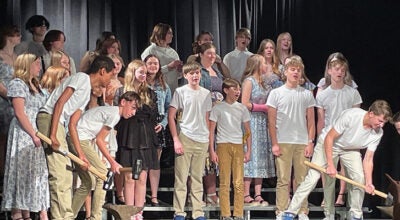In Google race, Austin seems to measure up
Published 6:33 am Friday, May 21, 2010
Austin might be a smallish city, but local officials hope some encouraging statistics make a big impact in their push for Google high-speed, fiber Internet.
The fiber advocacy group fiberforall.org ranks Austin 13th in community support among 1,077 cities vying for the experimental project, which will bring fiber Internet to an unspecified number of communities for free as Google looks to study the technology on a large scale.
The ranking is based on citizen involvement with social networking sites dedicated to promoting the project. For each city, fiberforall.org selected the most popular Google-related social networking tool — either a Facebook group, a Facebook page or a Twitter account — than divided the number of participants by the city’s population.
In Austin, the most popular tool has been a Facebook group, and to date, nearly 8 percent of the city’s population has gotten involved with it. By comparison, roughly 20 percent of Grand Rapids, Mich., has gotten connected with a Facebook fan page, putting the city on top of the community support heap.
Craig Hoium, Austin’s planning and zoning director who oversaw the city’s application, said he thinks the numbers are a good sign.
“I’m really pleased about what the (fiberforall.org) report says,” he said. “I think it’s fabulous.”
Hoium acknowledged that the rankings won’t be the only determining factor — Google has been vague about project specifics, but the company has stated that it is looking for a community of between 50,000 and 500,000 people, with the ability to test “bandwidth-intensive ‘killer apps’ and services” a primary goal. And when Hoium submitted the city’s application in late March, he supplied a wide array of information, from local weather to topography to demographics, all of which figure to be factored in somehow.
Still, the planning and zoning director said the community support evidenced by the fiberforall.org report is a good building block for the city, even if Google decides to go elsewhere.
That’s because the effort to rally support for the Google project, which has included the formation of a Google fiber committee and the website googleaustinmn.com, has given Hoium and others a number of ideas about how to organize community support in general, specifically through the Internet.
“We’re having ongoing discussions about what more we can do,” Hoium said of the informal committee, which consists of local business representatives and community leaders. “(And) it’s not necessarily all Google.”
But that doesn’t mean the Google project isn’t getting a lot of attention. Hoium said the next committee meeting will specifically address the fiberforall.org numbers and how to possibly move Austin up the list.
And it’s not just Austin looking at garnering community support in an effort to woo the Internet mega-company. In Topeka, Kan., a city of roughly 123,000 people, similar Web-centric steps are being taken to make the community stand out. This has included the launch of a Facebook group — which now has nearly 18,000 members — as well as a website dedicated to brining Google to the city.
By fiberforall.org’s measurements, the efforts are working — the Facebook group’s popularity puts Topeka sixth among cities in community support, with a score of 14 percent. In total support, which adds in Facebook page and Twitter account activity, Topeka ranks fourth, with roughly 20,000 supporters. And in the last week plus, the city has added roughly 500 more supporters, a jump of about 3 percent.
Jared Starkey, who runs several computer companies in Topeka and created the popular Facebook group, said these numbers aren’t a be-all-and-end-all. But he did say they are an interesting metric and that they reflect well on Topeka.
That it all happened so quickly is pleasantly surprising to Starkey, but also a testament to the power of social networking in this day and age.
“It caught on like wildfire,” Starkey said. “Social networking was crucial to that.”
However, like in Austin, Topeka’s efforts have evolved into something more than just a race for Google. Starkey said the organizing power he’s seen firsthand will be useful for years to come in getting people in his community together, whether online or in person.
“In a lot of ways, it was always just about wanting the best for Topeka,” Starkey said of the Google application process.
And in Austin, the thrust seems to be the same — take the lessons learned from the Google process so far and apply them throughout the community.
“We’re really happy about the whole application process,” Hoium said, noting the widespread organization that has occurred. “Are there other areas in the community we can approach about maybe doing things in the same way?”





